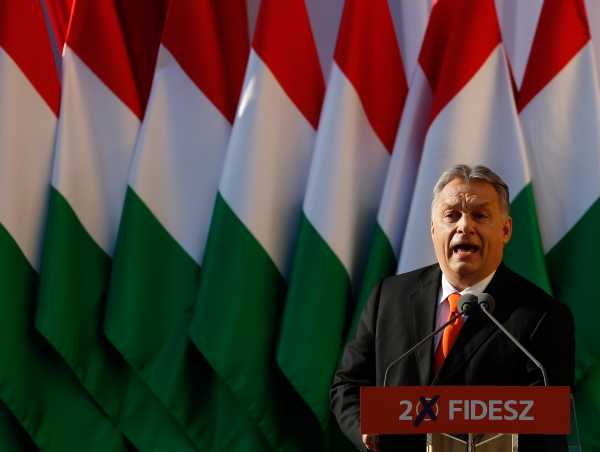
If you want to know where anti-immigrant right-wing populism can go if left unchecked, you should take a look at Hungary — which, under the pretext of cracking down on illegal immigration, passed a bill that gives the Hungarian government extraordinary powers to jail its political opponents.
This week, Hungary passed what the government dubbed the “Stop Soros” law, named after Hungarian-American billionaire George Soros. The new law, drafted by Prime Minister Viktor Orbán, creates a new category of crime, called “promoting and supporting illegal migration” — essentially, banning individuals and organizations from providing any kind of assistance to undocumented immigrants. This is so broadly worded that, in theory, the government could arrest someone who provides food to an undocumented migrant on the street or attends a political rally in favor of their rights.
“The primary aim of this legislation is to intimidate, by means of criminal law, those who fully legitimately assist asylum seekers or foreigners,” the Hungarian Helsinki Committee, a local human rights group, explains in a press release. “It threatens [to] jail those who support vulnerable people.”
Hungary’s government framed the bill as a check on the influence of Soros, a Jewish Holocaust survivor who funds pro-democracy activism around the world. Orbán has fingered Soros (who is also a favorite villain of the American right) as the source of an international plot to destroy Hungary through migration. He often launches attacks on the billionaire in strikingly anti-Semitic terms.
“We are fighting an enemy that is different from us. Not open, but hiding; not straightforward but crafty; not honest but base; not national but international; does not believe in working but speculates with money; does not have its own homeland but feels it owns the whole world,” Orban said in a characteristic anti-Soros tirade in March.
The Stop Soros bill is every fear about right-wing populism made manifest: an attack on basic democratic rights by an elected government, one legitimized and made popular by attacks on vulnerable minorities. Americans might want to pay attention.
Why Hungary’s government is obsessed with George Soros

Prime Minister Orbán was first elected — in a perfectly fair and democratic context — in 2010. Since then, he has made it his mission to ensure that no one could dislodge him from power.
He has attacked the independence of the court system, gerrymandered electoral districts so it’s nearly impossible for his Fidesz party to lose its electoral majority, and gotten his allies to buy up independent media outlets to mute criticism and disseminate propaganda. This agenda has not been subtle; he has openly declared his intention to bring an end to “liberal democracy” and replace it with an unspecified “Christian” system.
“We need to say it out loud because you can’t reform a nation in secrecy: The era of liberal democracy is over,” Orbán said in one speech. “Rather than try to fix a liberal democracy that has run aground, we will build a 21st-century Christian democracy.”
There’s still a lot of opposition to Orbán’s policies in Hungary, particularly in the capital city of Budapest. But Orbán is popular with a pretty significant chunk of Hungarian society. In the April 2018 parliamentary elections, the Fidesz party won a little under 50 percent of the vote. The next-closest party, the even-more right-wing Jobbik, won 19 percent.
This is partly a testament to the weakness of the Hungarian opposition. But it is also a testament to Orbán’s ability to manipulate fear and prejudice — specifically as it relates to migrants and minorities. The “Stop Soros” bill is not ancillary to the prime minister’s popularity; it’s at the core of it, an example of how he picks up on anxieties created by the refugee crisis to build support for an authoritarian agenda.
Soros really has invested a lot of money into Hungary. He got his start in activism in 1984, funding activists demonstrating against Hungary’s then-Communist government. Since then, he has funded civil society groups working to cement the country’s transition from dictatorship into democracy, among other philanthropic projects.
This sort of activity is obviously quite threatening to a would-be authoritarian like Orbán, who has cast Soros as a kind of a James Bond villain in a strikingly successful bid to check his influence. In 2017, the government put up posters with his face twisted in a nefarious-seeming smile, with the captions “don’t let Soros have the last laugh” and “99 percent oppose illegal immigration” underneath.
Soros’s aim, according to Orbán, is to undermine the soul of European Christian society — to hollow out the West from the inside out. Soros’s humanitarian activity is supposedly secretly indoctrinating Hungarians in a bid to let them acquiesce to mass migration. Once Soros and his allies succeed in opening the borders, Orbán warns, Muslim refugees will flood into Hungary and the rest of Europe — and soon the continent will become unrecognizable.
“We are up against media outlets maintained by foreign concerns and domestic oligarchs, professional hired activists, troublemaking protest organizers, and a chain of NGOs financed by an international speculator, summed up by and embodied in the name George Soros,” as he put it in one speech. “Those who do not halt immigration at their borders are lost: slowly but surely they are consumed. External forces and international powers want to force all this upon us, with the help of their allies here in our country.”
This kind of paranoid rhetoric, which should sound familiar to American ears, is a hallmark of Orbán’s public commentary — and has served as a justification for all sorts of different anti-democratic and anti-minority crackdowns.
Orbán has campaigned to close the Central European University, a prestigious university in Budapest funded by Soros, on grounds that it’s corrupting Hungarian society. He has built not one, but two, walls on Hungary’s southern border with Serbia — cutting off access from a route desperate refugees have used to get into Europe. Soros’s Open Society Foundation, his international pro-democracy charity, closed down all of its Budapest operations in May (citing a climate of persecution).
And now, the Hungarian parliament has passed the “Stop Soros” law — a bill that human rights advocates fear will be used to shut down opposition groups and local rights campaigners.
Cas Mudde, an expert on right-wing politics at the University of Georgia, defines the radical right as possessing three features: an authoritarian approach to law and order, a populist critique of elites as out of touch and corrupt, and a nativist ideology that casts immigrants as a threat to the nation. Orbán, as the “Stop Soros” law proves, embodies all three of these descriptors perfectly.
He’s certainly not the only politician in the Western world who does.
Sourse: vox.com






